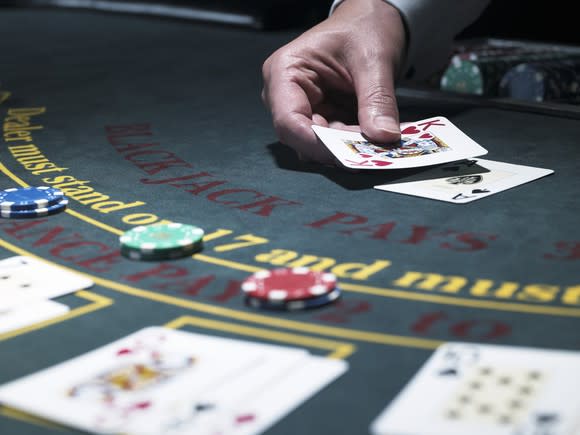MGM Resorts International Q3: America First
In some ways, MGM Resorts International (NYSE: MGM) is a throwback casino operator. In contrast to its most prominent competitors, who now get most of their take from abroad, it draws the bulk of its revenue from U.S. operations.
How has this domestic slant been working out for MGM recently? Last week the company reported its third-quarter results. Let's flip over the cards and see how it did.

Image source: Getty Images.
New players at the table
On the top line, MGM grew modestly. The company's top net revenue figure for the quarter was nearly $2.83 billion, which represented growth of 4% on a year-over-year basis. Much of this increase came from the company's numerous U.S. resorts -- collectively, they increased their take by nearly 20% to over $2.2 billion.
This nice pop was largely due to the consolidation of the Borgata Hotel and Casino in Atlantic City, a $900 million deal that closed in August 2016. Additionally, this quarter included the revenue from the company's National Harbor, a Washington, D.C.-area resort that opened in December of that year.
MGM's overall net profit took a steep dive by almost 70% to $176 million ($0.26 per share). The year-ago quarter, however, included a $430 million gain from the Borgata acquisition; on a per-share basis, this amounted to $0.60.
All told, the company beat on revenue but whiffed on the bottom line. The average analyst estimate for the former was $2.76 billion, and for the latter $0.34 per share.
As mentioned, unlike its top American competitors -- namely Las Vegas Sands (NYSE: LVS) and Wynn International (NASDAQ: WYNN) -- MGM isn't as large a player abroad. This will change somewhat in the near future (more on that in a moment). Regardless, the company's two properties in China took in net revenue of $471 million in Q3, a 6% decline. The company attributed the slide to drops in table games revenue.
Meanwhile, MGM declared a quarterly dividend of $0.11, matching the level of its predecessor. That represents a payout ratio of 42%; the distribution will be paid on Dec. 15 to stockholders of record as of Dec. 11.
This Fool's take
MGM's results for the quarter broadly met analyst expectations. As anticipated, Borgata and National Harbor made substantial contributions to revenue. The former did particularly well under its new management, growing its net revenue by 62% to $244 million. Both resorts were profitable on an operating basis.
For MGM shareholders, though, all eyes should be on Asia. Following several delays, the company's splashy new MGM Cotai resort in the eponymous district of Macau is slated to open in January. At first glance this is very inspiring news, as the enclave has seen dramatic improvements in gambling revenue lately -- in fact, it notched a three-year high in October, rising by 22% on a year-over-year basis.
That upward trajectory has benefited Las Vegas Sands and Wynn International, both of which firmly planted their flags in Macau years ago. The pair, which not long ago opened new resorts on the enclave -- Parisian Macao in the case of Las Vegas Sands, and Wynn Palace for its rival -- have seen their stock prices rise on the back of that revenue recovery.
Although investors will certainly be happy once MGM opens the doors to Cotai, it's questionable whether the new facility will be a monster money maker. After all, the action lately in Macau is in the VIP segment, which has returned to the enclave with a vengeance and is fueling its current success.
MGM has opted not to have any VIP tables at Cotai at all. This will likely please the authorities in Beijing, whose aim in green-lighting the development of Cotai was to attract a broader, mass-market crowd. But that strategy won't draw the big money that's been pumping the enclave's economy lately.
So at the end of the day, MGM's doing fine domestically, but it's a bit behind overseas. Even when MGM Cotai opens, that dynamic might not change all that much. I'd say that makes MGM not a particularly compelling investment at the moment.
More From The Motley Fool
6 Years Later, 6 Charts That Show How Far Apple, Inc. Has Come Since Steve Jobs' Passing
Why You're Smart to Buy Shopify Inc. (US) -- Despite Citron's Report
Eric Volkman has no position in any of the stocks mentioned. The Motley Fool has no position in any of the stocks mentioned. The Motley Fool has a disclosure policy.

 Yahoo Finance
Yahoo Finance 